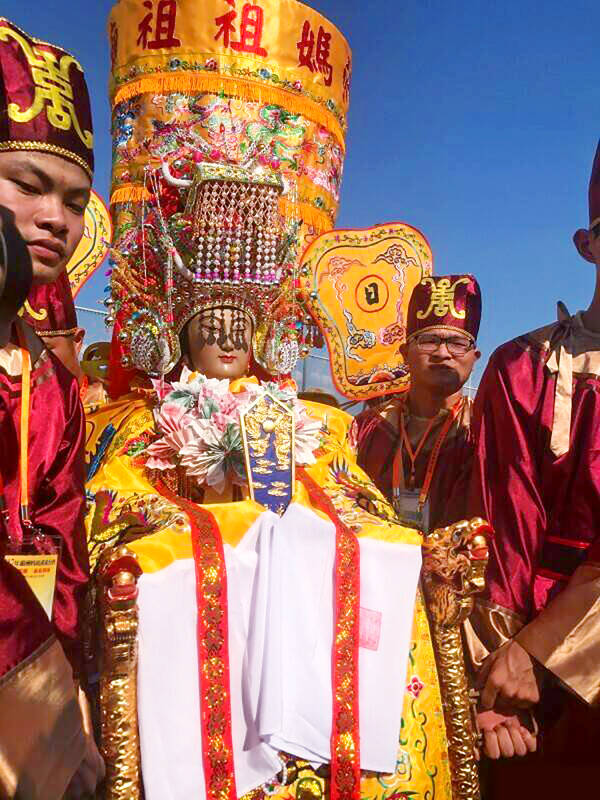China is attempting to subsume Taiwanese culture under Chinese culture by promulgating legislation on preserving documents on ties between the Minnan region and Taiwan, a Taiwanese academic said yesterday.
China on Tuesday enforced the Fujian Province Minnan and Taiwan Document Protection Act to counter Taiwanese cultural independence with historical evidence that would root out misleading claims, Chinese-language media outlet Straits Today reported yesterday.
The act is “China’s first ad hoc local regulations in the cultural field that involve Taiwan and is a concrete step toward implementing the integrated development demonstration zone,” Fujian Provincial Archives deputy director Ma Jun-fan (馬俊凡) said.

Photo: Taipei Times
The documents “reflect cross-strait historical ties and exchanges, and carries the memory of Chinese, attesting to the fact that people on both sides of the Taiwan Strait originate from the same root… and belong to one China,” she said.
The act says that the document preservation units “may collect documents on Minnan-Taiwan relations through donations, purchases, replication and other approaches,” while non-state museums would be encouraged to “take part in the preservation and use of Minnan-Taiwan relations documents via collection, compilation and exhibition.”
“People from Hong Kong, Macau and Taiwan, as well as overseas Chinese people, are encouraged to actively promote the documents on Minnan-Taiwan relations and take part in the preservation and use of the documents,” it says.
In Taipei, Hung Chin-fu (洪敬富), a professor of political science at National Cheng Kung University, yesterday said these are attempts to tie Taiwan to the Minnan region ethnically and culturally through efforts such as the demonstration zone for cross-strait integrated development set up in China’s Xiamen City.
The act is an escalation of cultural warfare against Taiwan to the legislative level and constitutes “lawfare,” a type of influence operations, he said.
Beijing attempts to prevent Taiwan from culturally separating itself from China by using laws to strengthen ties between Minnan and Taiwan in terms of cultures, customs, traditions and festivals, Hung said.
While threatening to take Taiwan by force using “guns,” Beijing also uses “pens” to claim that Taiwanese culture is “part of Chinese culture” and Taiwan and China “share the same ancestry and bloodline,” he said.
By emphasizing the Chinese origins of Taiwanese religions and cultures, such as the sea goddess Matsu (媽祖) and god of war Guan Gong (關公), Beijing attempts to form and fuel public opinion that could influence the political views of people in Taiwan, Hung said.
“This is ‘united front’ tactics without gunfire,” with the goal of undermining Taiwanese subjectivity and subsuming its cultural sovereignty under China, he said.

Taiwan is to commence mass production of the Tien Kung (天弓, “Sky Bow”) III, IV and V missiles by the second quarter of this year if the legislature approves the government’s NT$1.25 trillion (US$39.78 billion) special defense budget, an official said yesterday. Commenting on condition of anonymity, a defense official with knowledge of the matter said that the advanced systems are expected to provide crucial capabilities against ballistic and cruise missiles for the proposed “T-Dome,” an advanced, multi-layered air defense network. The Tien Kung III is an air defense missile with a maximum interception altitude of 35km. The Tien Kung IV and V

The disruption of 941 flights in and out of Taiwan due to China’s large-scale military exercises was no accident, but rather the result of a “quasi-blockade” used to simulate creating the air and sea routes needed for an amphibious landing, a military expert said. The disruptions occurred on Tuesday and lasted about 10 hours as China conducted live-fire drills in the Taiwan Strait. The Civil Aviation Administration (CAA) said the exercises affected 857 international flights and 84 domestic flights, affecting more than 100,000 travelers. Su Tzu-yun (蘇紫雲), a research fellow at the government-sponsored Institute for National Defense and Security Research, said the air

A strong continental cold air mass is to bring pollutants to Taiwan from tomorrow, the Ministry of Environment said today, as it issued an “orange” air quality alert for most of the country. All of Taiwan except for Hualien and Taitung counties is to be under an “orange” air quality alert tomorrow, indicating air quality that is unhealthy for sensitive groups. In China, areas from Shandong to Shanghai have been enveloped in haze since Saturday, the ministry said in a news release. Yesterday, hourly concentrations of PM2.5 in these areas ranged from 65 to 160 micrograms per cubic meter (mg/m³), and pollutants were

Taiwan lacks effective and cost-efficient armaments to intercept rockets, making the planned “T-Dome” interception system necessary, two experts said on Tuesday. The concerns were raised after China’s military fired two waves of rockets during live-fire drills around Taiwan on Tuesday, part of two-day exercises code-named “Justice Mission 2025.” The first wave involved 17 rockets launched at 9am from Pingtan in China’s Fujian Province, according to Lieutenant General Hsieh Jih-sheng (謝日升) of the Office of the Deputy Chief of the General Staff for Intelligence at the Ministry of National Defense. Those rockets landed 70 nautical miles (129.6km) northeast of Keelung without flying over Taiwan,